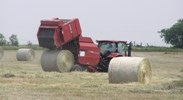
Forage Testing Project Open to Iowa Producers
Continued wet weather this year is having an impact on forages for Iowa cattle, and this project from the Iowa Beef Center can help producers understand their forage quality and how to make any necessary adjustments in rations. If you are interested in having forage tested, contact your county ISU Extension office or ISU Extension beef specialist.
October 5, 2010

This year's soggy summer weather has been one for the record books in Iowa - and that's not good news for the state's cattle producers. Dan Loy, director of the Iowa Beef Center at Iowa State University notes that the continued rain has made hay baling difficult, resulting in over-mature hay crops, rain damaged hay and a lack of hay supplies in some areas.
"Our beef team has developed a forage testing and cattle feeding project to help producers manage their poor forage conditions and prevent calving problems," says Loy. "This forage testing project is a multi-pronged approach by ISU Extension beef specialists to determine the nutrient value of this year's forages, to assist farmers in balancing feed rations for cattle performance and to educate people about forage nutrient values and rations."
First phase of the project is this fall - collecting forage samples
First phase of the project is taking place this fall - collecting and testing forage samples. IBC, the Grass Based Livestock Working Group from the Leopold Center for Sustainable Agriculture, Iowa Forage and Grassland Council and the Southern Iowa Forage and Livestock Committee are sponsoring this first phase.
Additional sponsors are being sought for the education portion of the project and a second year of testing. The project currently includes a 50% cost share on sample testing for producers, thanks in part to a collaboration with Dairyland Laboratories in Wisconsin.
In addition to receiving information on quality of their forages, producers may use the test results to prove losses under the Farm Service Agency's Supplemental Revenue Assistance Payments (SURE) Program.
Denise Schwab, ISU Extension beef specialist who is helping lead the project, says county Extension offices are vital links. "Extension beef specialists will work directly with county offices to provide sample bags, information forms and mailing envelopes, and do necessary monitoring of samples and locations," she says.
"County offices are our partners in this project," she adds, "from publicizing its availability to helping direct producers to the appropriate people and resources to participate. Producers will bring their samples to the county office, so the office staff people are vital to the success of this project."
Most of the samples will be hay, but some silage samples, too
While most of the samples will be weather-impacted hay samples, Loy says the project also will include some silage samples. "We want to be sure we have adequate sample numbers to be able to offer ration balance assistance yet this fall for winter feeding," he says. "If you're interested in taking part, or have questions about the project, contact your county ISU Extension office or your beef specialist soon."
A listing of Extension beef specialists and contact information is at www.extension.iastate.edu/ag/fs.html. Persons who would like to learn more about forage sampling can download, print and use a newly updated publication from IBC, "Forage Sampling and Sampling Equipment" at www.extension.iastate.edu/Publications/PM1098B.pdf.
IBC was established in 1996 with a goal of supporting the growth and vitality of the state's beef cattle industry. It comprises faculty and staff from ISU Extension, College of Agriculture, the College of Veterinary Medicine and works to develop and deliver the latest research-based information for the cattle industry. Visit the IBC blog at blogs.extension.iastate.edu/iowabeef/.
You May Also Like



